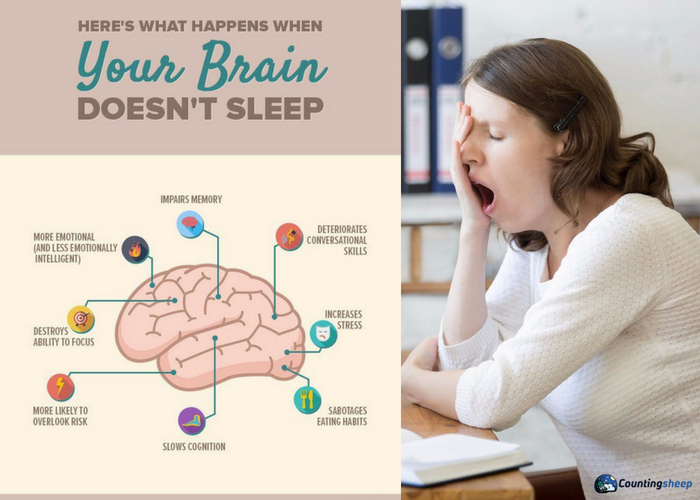Whenever we end up spending the whole night restless in bed, it’s a given that our day will kick off on a bad note. We’ll start feeling irritable, on edge, and utterly drained. According to the most recent sleep data, 35.3% of adults say they get less than 7 hours of sleep in a 24-hour cycle. Studies also indicate that about 37% of adults between the ages of 20 and 39, and 40% of those aged 40 to 59, experience a lack of sleep. Despite what health authorities advise, over half of Americans believe they get enough sleep. However, more than 40% of the population feels they would benefit from more sleep.
59% of Americans currently spend around 6.8 hours sleeping, and that is way less than, for example 70 years ago, when 84% of Americans had an 8 hour sleep. That means that approximately 4 out of 10 Americans is not getting enough sleep. Are you among them?
Signs of Sleep Deprivation
If you continue missing out on the recommended 8 hours of sleep every night, you are jeopardizing both your physical and mental health. Sleep deprivation should be taken seriously because lack of sleep can completely drain our mental abilities and put our physical health at real risk. Sleep experts have linked sleep deprivation with various kinds of health problems, starting from weakened immunity, frequent mood changes, and memory issues to weight gain, high blood pressure and diabetes.

If you are constantly hungry, more impulsive than usual, and it seems like your emotions all over the place, think whether or not you have had enough sleep lately. If your motor skills are off, you are having troubles making decision, and you have memory issues, you definitely need to get more sleep. Apart from these signs, you may also experience weight gain, skin problems, and have troubles with your vision. As you can see, when you are sleep deprived, your entire body struggles. People who have less than 8 hours a sleep during a night also have a weaker immune system and often get sick.
How Sleep Deprivation Affects Your Body
Central nervous system: In case you are struggling with insomnia, your central nervous system will be the first one to react. In order to function normally and properly send information through your body, your central nervous system needs you to sleep. During sleep, new pathways are formed between neurons in your brain and those pathways are crucial for remembering new information you have learned during the day. If you don’t sleep, your brain will be exhausted and it won’t be able to form those pathways that help you remember what you have previously learned. Therefore, the first sign of sleep deprivation will be shown in lack of concentrating or learning, as well as memory issues. Since the information your body sends can come at a delay, your coordination and motor skills may be decreased or unstable.

If sleep deprivation continues, your mental abilities will suffer and your emotional state will frequently change. You will suddenly become prone to mood swings and you may become impatient, impolite, impulsive and similar. In extreme cases, you might experience microsleep during the day. Microsleep means you have fallen asleep for a few seconds or minutes without realizing it. This is an alarming sign that your body really needs sleep, and that it needs it immediately. Micro sleep is very dangerous because it can lead to injuries and accidents, especially if you fall asleep while driving.
Immune system: your immune system requires sleep in order to restore itself and produce substances that will be ready to combat dangerous invaders such as viruses and bacteria. Getting enough sleep is crucial for defending your body against diseases. Without enough sleep, your immune system cannot build proper protection to fight off invaders. In severe cases of sleep deprivation, you increase risk for chronic illnesses such as diabetes and heart disease
Digestive system: Sleep affects the levels of two hormones that are vital for controlling the feelings of hunger and fullness. Those hormones are leptin and ghrelin. In case of sleep deprivation, these hormones will not be able to do their work properly. Instead, the levels of leptin will decrease, while the levels of ghrelin will increase, resulting in unnatural craving for snacks during night or overeating in the evening. Lastly, sleep deprivation also lead to releasing higher levels of insulin after a meal. Since insulin control your blood sugar level and promotes fat storage, you do not only risk gaining weight, but also diabetes.
Endocrine system: Never forget that hormone production primarily depends on your sleep. In order for your endocrine system to function normally, you need at least 6 hours of uninterrupted sleep. The time you go to bed is also very important because some hormones only produce during sleep and at particular hours of the night. For example, growth hormone, prolactin, and luteinizing hormone increase during sleep. Growth hormone is secreted in the first few hours of sleep, while other hormones are secreted during the first slow-wave sleep or deep sleep.
How to Sleep Better
Your body needs sleep as much as it needs food and air. So, if you have troubles sleeping at night, you should try optimizing your sleep. Getting a quality mattress, having sex before bed and sleeping with you partner are one of the things that could help you sleep better. Don’t allow sleep deprivation to lower the quality of your life and impact your physical and mental health. Optimize your sleep with the following tips:
- Get a new mattress – If you sleep on an old mattress, have in mind that it may be filled with mold, dust mite droppings, and other allergy triggers. Sleeping on a good mattress that is allergen-free and provide good support can help you deal with insomnia and sleep deprivation.
- Ensure the atmosphere in your bedroom is perfect for falling asleep – Power down any devices that may disturb your sleep such as phones, TV, computers etc. Set the temperature between 68 and 72 degrees.
- Train and set your inner body clock – establish a sleeping routine and stick to it. Go to sleep and wake up at roughly the same every day to help your body and brain create a healthy snooze-wake schedule.
- Eat and drink healthier – Avoid drinking too much coffee and consuming food and drinks with caffeine. Avoid eating fast food or having heavy meals for dinner.
- Cut down alcohol and tobacco consumption.
- Relax before you go to sleep – reading, meditating, listening to quiet music, or taking a warm bath should help you relax and fall asleep easier.
Sleep Related
Let us know if you liked the post. That’s the only way we can improve.
Co-founder of Counting Sheep and Sleepaholic

